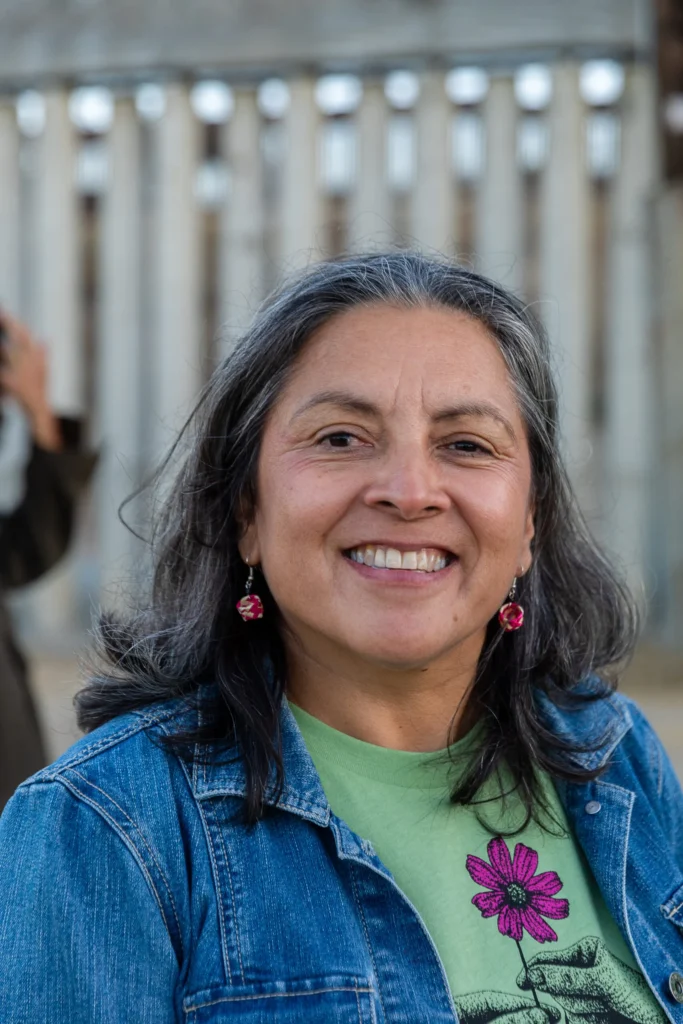
Editor’s Note: The following article is part of our “Debunking the Lies” campaign. This article was originally published in The San Diego Union-Tribune by Adriana Jasso, the Program Coordinator for the U.S./Mexico Border Program of the American Friends Service Committee (AFSC).
This month, Republican vice presidential candidate JD Vance said to reporters he wants to stop the “insanity” at the southern border after spending about 20 minutes touring the border at an open-air detention site in San Ysidro that Border Patrol agents have named “Whiskey 8.”
I’ve been there every day for the past year.
“Whiskey 8” is located between the two 30-foot-tall border walls west of San Ysidro Port of Entry. In September of last year, the U.S. Border Patrol began holding migrants at outdoor sites along the U.S.-Mexico border without access to basic services. Through the border barriers, I work with volunteers to hand people water, food, and clothing and tend to their wounds as best we can.
On a recent morning, I stood by the wall with a woman who had just arrived on the other side. Her hand shook uncontrollably and a few seconds later her body began to do the same. As I held her hand through the wall and saw tears stream down her cheeks, she began to panic. Her young son started to cry. I told her to try to calm her breathing because that would help her body regulate. She said herself and her family had just crossed through the first border wall. She said she was asthmatic and kept touching her chest; I asked her to breathe slowly with me.
I told her my name and shared about the many volunteers who keep the solidarity stations to help people like her and her family as they pass through our border region. I could feel her hand relaxing a little and her son looked up and made eye contact with me. I asked her where she was from, and she told me Michoacan, Mexico.
I felt her hand tense again and she said, “They killed my son yesterday.”
Seconds later I heard the familiar sound of a Border Patrol vehicle approaching the area at a high speed. I let go of her hand and quickly gave them basic recommendations about what to expect. As fast as I could, I told them to remove the shoelaces, to only wear one layer of clothing and to make sure they had no food or water with them since the Border Patrol does not permit it.
The two families gathered their few items and as the Border Patrol agent ordered from a distance, I asked her for her name. She turned back and with a soft smile said, “my name is Alma Rosa.”
Alma Rosa’s profound pain is like that of asylum seekers I see every day.
On Aug. 11, as I approached the wall, I met Antonela, a 4-year-old who traveled with her mother from Colombia and had crossed the first border wall at about 4 a.m. with a group of eight people. After a brief introduction, I offered coffee and granola bars to the small group while I passed several folding chairs through the wall for them to sit down.
Jenny, a 48-year-old woman from Panama, struggled to get off the ground and let out a scream as she put weight on her right leg. Juan from Colombia was quick to hold her arm and help her to get to the chair. I asked Jenny if she was hurt, and she said she had fallen from the wall hours ago and was experiencing extreme pain. I gave her pain medication. Juan was sitting closest to the wall and whispered to me, “I saw it all happen, I was the first one to cross and she was after me, she was not able to get a grip and fell from the very top.”
Looking out into the distance as the morning sunrise began to show a soft purple color, he said, “It was like watching a movie, except that it was real.”
I wish this entire year at the border was just a movie. I wish it was an improbable fiction that leaders from both major political parties are competing to see who can be the cruelest to Alma Rosa, Jenny, Juan, their children and thousands of others. I wish we lived in a country that respected the right to seek asylum.
But the walls, and the people trapped behind them, are not a fiction, or a metaphor, or chess pieces for politicians to move around a board at will. For politicians using the border wall as a backdrop for their political campaigns, they must understand that the people arriving are human beings with hopes and dreams and fears, just as we all are.
After 365 days at the border wall, I can tell you that the hyperbolic rhetoric of politicians has nothing to do with reality. There is no “border crisis” — or at least not the kind they want you to imagine. The crisis is a moral one. Will we accept an immigration system rooted in violence, exclusion and cruelty? Or will we embrace fair, welcoming and just policies that benefit all our communities?
Jasso is the program coordinator for the U.S./Mexico Border Program of the American Friends Service Committee. She lives in South San Diego.
El Tribuno del Pueblo brings you articles written by individuals or organizations, along with our own reporting. Bylined articles reflect the views of the authors. Unsigned articles reflect the views of the editorial board. Please credit the source when sharing: tribunodelpueblo.org. We’re all volunteers, no paid staff. Please donate at http://tribunodelpueblo.org to keep bringing you the voices of the movement because no human being is illegal.
